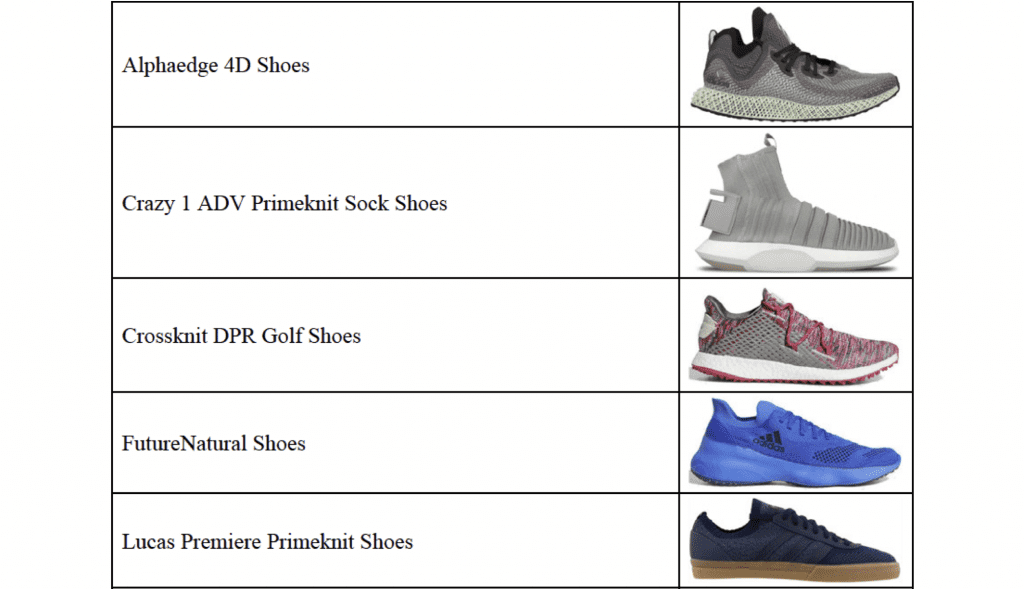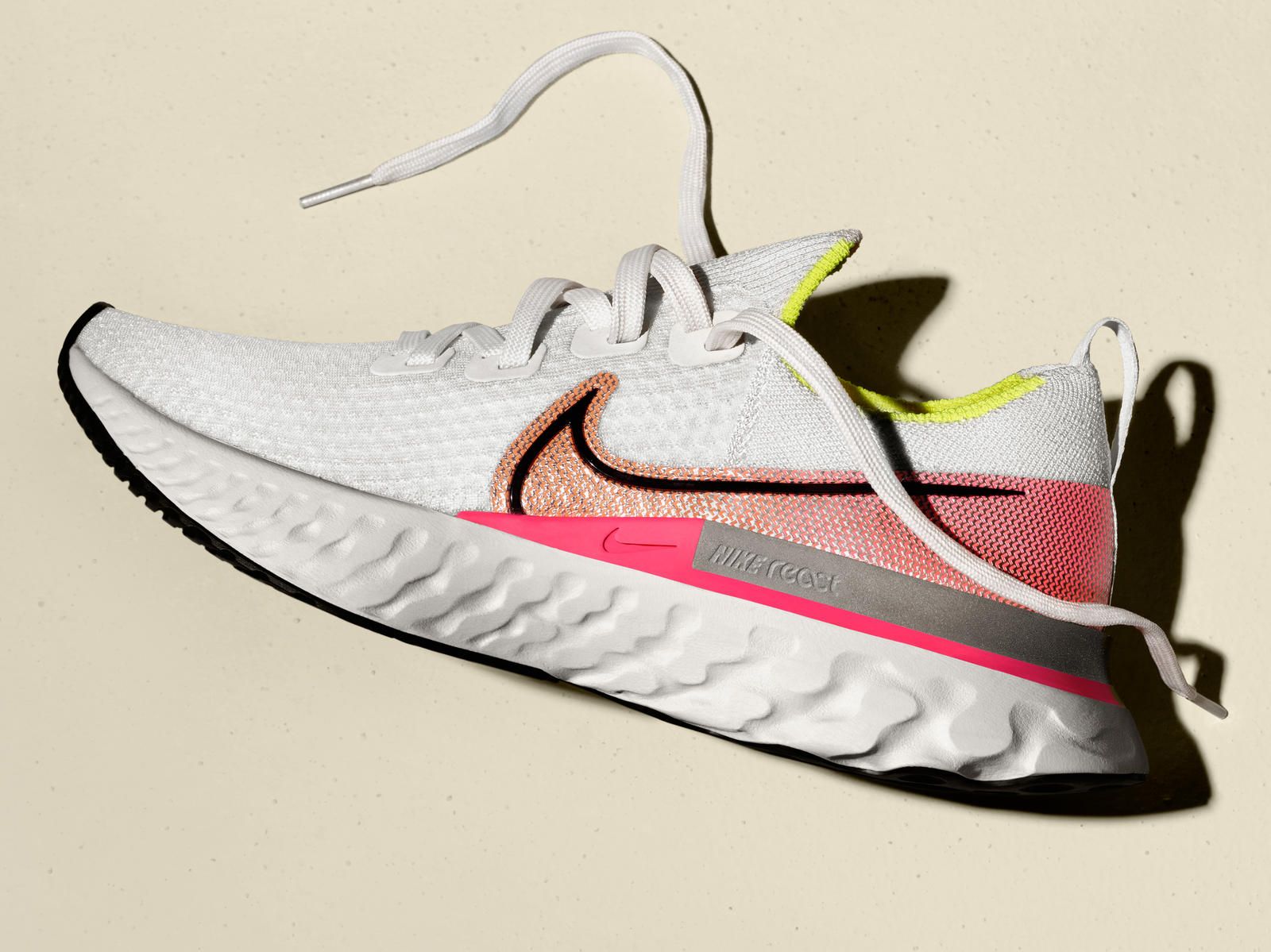Almost a decade-long fight between Nike and adidas has turned into a case before the International Trade Commission (“ITC”), Nike asking the federal trade body to block the importation of Primeknit shoes from Adidas on the grounds that the sneaker technology infringes a number of its utility patents. In its complaint to the ITC on Wednesday, Nike alleges that adidas violates Section 337 of the Tariff Act of 1930 by importing sneakers that infringe its rights to “game-changing” Flyknit technology and the “new method of designing and manufacturing uppers that allow Nike to create shoes that excel in performance, design and aesthetics, while reducing materials and waste.
In laying the groundwork in its complaint, Nike says it is “investing heavily in research, design and development” to create new “technologies and products that improve athletic performance, reduce injuries and maximize comfort while reducing waste. ” Among these groundbreaking developments is its Flyknit, which Nike says is “the culmination of more than a decade of research and development,” and the result of Nike spending a substantial sum of money (and written ).
Contrary to itself, Nike asserts that “adidas AG, adidas North America, Inc. and adidas America, Inc. (collectively, the“ Respondents ”or“ adidas ”) have renounced independent innovation” and, the instead, “have spent much of the past decade defying many of Nike’s patents involving Flyknit technology. The relevant Nike patents in the ITC case are 9,918,511; 9,743,705; 8,266,749; 7,814,598; 9,060,562; and 8,898,932, which generally relate to “specific aspects of knitted textile uppers”; “Knitted uppers that have an integral tongue that is part of the knitted uppers; And “an upper with a knitted component and a layer of skin attached to the knitted component.”
These challenges, according to Nike, include “unsuccessful petitions to the United States Patent and Trademark Office’s Patent Trial and Appeal Board which targeted two of Nike’s patents at issue in this case.” , and subsequent appeals to the U.S. Federal Circuit Court of Appeals and the Supreme Court, in which Nike claims adidas also failed.
All the while, as adidas “unsuccessfully challenged” the Flyknit patents, the German sportswear giant “continued to use Nike’s patented technology without permission,” says Nike. The result, according to the Beaverton, Oregon-based behemoth? “Today, adidas offers dozens of footwear products that infringe Nike’s patents,” including through its “many so-called Primekit shoes.”
In view of the above, Nike says it is “forced to take this action to defend its investments in innovation and protect its technology by ending unauthorized use of Adidas.” Specifically, Nike asked the ITC to initiate an investigation into Adidas’ alleged violations of Section 337 of the Tariff Act, namely its “illegal and unauthorized importation into the United States” and subsequent sale of “Certain knitted shoe products that infringe Nike’s patents protecting its Flyknit technology. Nike is also seeking a limited exclusion order and cease and desist orders against Adidas in connection with certain footwear products that allegedly infringe the aforementioned patents.
Section 377 provides for the investigation of unfair acts in connection with the importation of items into the United States, with the primary remedy for violation being an exclusion order preventing the goods in issue from entering the United States. United The power of the Washington, DC-based ITC to grant broad exclusion orders, which are a powerful recourse to ban the entry into the United States of counterfeit items, has made it a growing forum popular for handling intellectual property disputes for US companies and foreign companies present in the United States.

Beyond that, the “uniquely fast and compressed nature of an ITC Section 337 investigation” makes it an attractive forum for businesses to assert their rights, by Lawyers for Squire Patton Boggs Adam Hess and David Prueter. “Unlike disputes in district courts, which can take several years to reach a trial date, a case filed in the ITC can go to an evidentiary hearing before an administrative law judge in eight to nine hours. month.”
The ITC complaint is part of a larger fight between Nike and adidas over the two companies’ respective knitted shoes, a long-standing clash began in the immediate wake of the London 2012 Olympics. Olympics, Nike and adidas released their first knitted running shoes: Nike announced the launch of its Flyknit shoe in February 2012, while adidas unveiled its knitted shoes the following July, hailing the product as “a shoe of one of a kind race ”.
The clash took the form of a lawsuit initiated by Nike in Adidas’ native Germany, as well as an array of inter partes examinations (that is, proceedings for invalidation of previously granted patents) before the Patent Trial and Appeal Board and challenges before the United States Court of Appeals for the Federal Circuit. Nike has argued throughout the respective rounds of the knit-centric battle that it “has a strong legacy of innovation and leadership in shoe design and development” and that its patents are “the foundation of this. leadership, and we vigorously protect them. ” Meanwhile, adidas has consistently and “vigorously” denied claims of patent infringement, saying its Primeknit technology is the direct result of “years of dedicated research.”
The case is In the Matter of CERTAIN KNITTED FOOTWEAR, 337-3580, US International Trade Commission.

